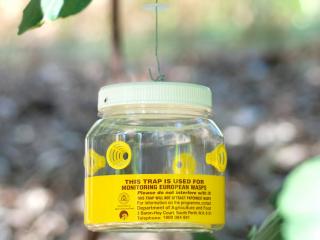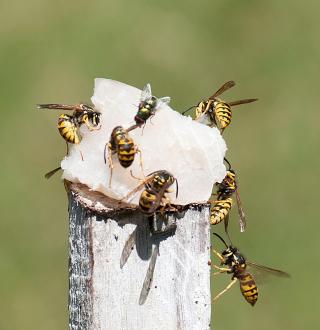Residents in Roleystone and surrounding suburbs are asked to keep a look out for European wasps following the recent detection and destruction of six nests in the suburb so far this year.
The European wasp (Vespula germanica) is considered the world's worst social wasp and due to its potential to flourish in Western Australia, it is a prohibited pest in this State.
Department of Agriculture and Food entomologist Marc Widmer said the wasps threatened Western Australia’s horticulture, viticulture and apiculture industries.
“If they established in WA, European wasps would significantly affect the environment, our outdoor lifestyle, tourism industry, human health and the wellbeing of pets and livestock,” Mr Widmer said.
“Since 1977, the department has successfully eradicated European wasp incursions and prevented the pests’ establishment in WA, with the support of the community and local government.
“European wasps are established in the Eastern States and each year, fertilised wasp queens inevitably arrive here in freight and cargo and start new nests.
“The department’s surveillance grid of more than 900 traps is supplemented by an ‘Adopt-a-Trap’ initiative, implemented in 2011, which enables local government and residents to participate in European wasp surveillance and trapping.
“Community awareness and involvement greatly improves the detection and eradication of new nests, and helps prevent the wasp from establishing in WA.
“So far, more than 700 traps have been ‘adopted’ in Western Australia.”
People who ‘Adopt-a-Trap’ hang it in their grounds with a raw fish lure, regularly replacing it and checking it for wasps.
Wasps caught in the trap are reported to the department, and if they are European wasps, the department will find and destroy the nest.
European wasps are scavengers, so if a wasp settles on pet food, fish or other meat products, they should be reported immediately to the department’s Pest and Disease Information Service on freecall 1800 084 881 or email info@agric.wa.gov.au.
Mr Widmer said while awareness about European wasps was fantastic, in many cases people had mistaken the common yellow paper wasp for the pest European wasp.
“There are some tell-tale clues to identify European wasps: they have a thick body, about the same size and shape as a bee; they are a bright yellow colour with black stripes and yellow legs; and their antennae are entirely black,” he said.
“European wasps fly swiftly with their legs tucked up close to their body and their large nests are usually built into the ground, housing thousands of wasps.”
More European was identification information was available on the department website.
Last season the department destroyed 84 nests, the majority of which were found in the City of Cockburn and the industrial suburbs Welshpool and Kewdale.
More information about the ‘Adopt-a-Trap’ initiative is available on the department website. The non-toxic traps are free and available by calling freecall 1800 084 881, your local department office, or by emailing info@agric.wa.gov.au.
Any suspect European wasp sighting should be reported to the department’s Pest and Disease Information Service (PaDIS) on freecall 1800 084 881 or email info@agric.wa.gov.au

Media contacts: Jodie Thomson, Dionne Tindale, media liaison +61 (0)8 8368 3937

